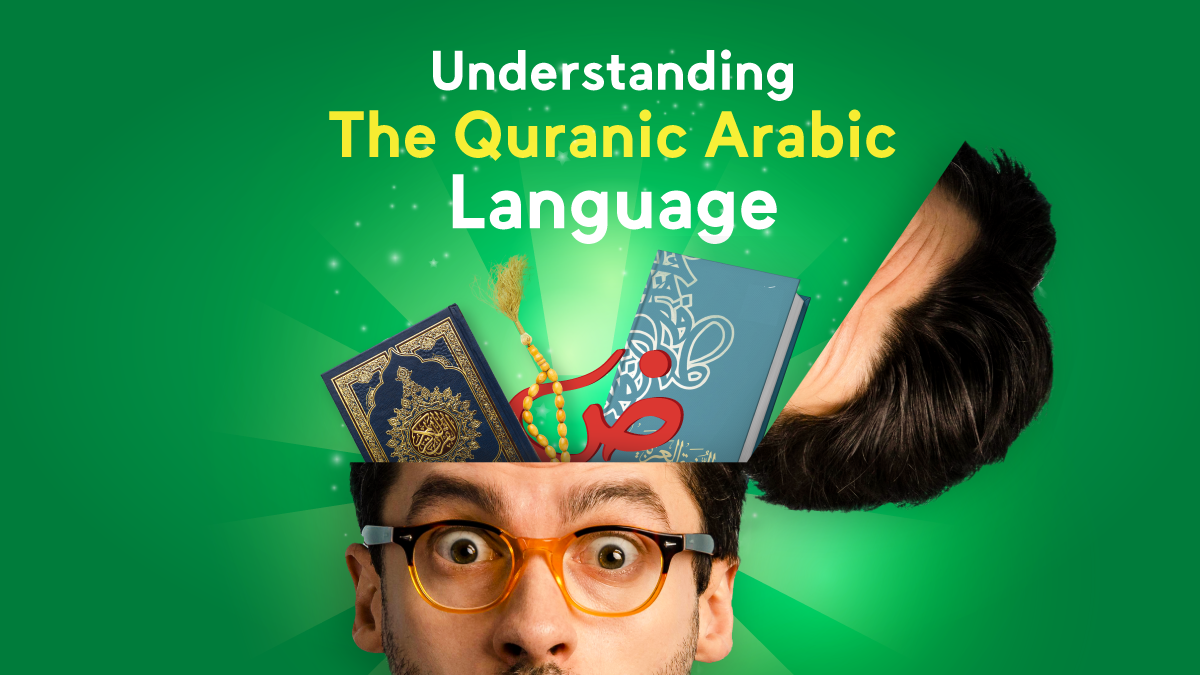
Learning The Quranic Arabic language holds a special place in the hearts of Muslims worldwide. It is the language in which the Quran was revealed and carries a profound significance in understanding the divine scripture. In this article, we will delve into the importance of understanding Quranic Arabic, its unique characteristics, and practical tips to enhance comprehension and appreciation of the Quran’s timeless message.
Quranic Arabic Language
Learning The Quranic Arabic language requires dedication, guidance, and a systematic approach. In this article we explore the special features of the Quranic Arabic Language, its importance and provide practical strategies for learning this unique and eloquent form of the Arabic language.
Quranic Arabic Language has special features
Historical Significance
- Quranic Arabic represents the language spoken during the time of the Prophet Muhammad in the 7th century.
- It has historical and cultural significance as it provides insight into the linguistic context in which the Quran was revealed.
Literary Excellence
Quranic Arabic is renowned for its literary beauty and eloquence.
- The Quran features intricate linguistic structures, poetic devices, and rhetorical techniques that contribute to its aesthetic appeal.
- By studying Quranic Arabic, one can appreciate the linguistic richness and literary excellence of the Quran.
Unique Vocabulary
- It employs a unique vocabulary that sets it apart from other forms of Arabic.
- It incorporates words and expressions that may not be commonly used in contemporary Arabic dialects.
- To understand the Quran fully one needs to familiarize themselves with this specific vocabulary and its meanings.
Grammar and Morphology
- The Quranic Arabic language has its own grammar and morphology.
- The study of Quranic Arabic involves understanding the rules and structures that govern the language such as
- verb conjugations.
- noun declensions.
- sentence construction.
Classical Forms and Expressions
Quranic Arabic includes classical forms of verbs, nouns, and pronouns that are distinct from their modern counterparts.
- It also employs unique expressions and idiomatic phrases.
- Familiarity with these classical forms and expressions is crucial for accurately understanding and interpreting the Quran.
Linguistic Nuances
- Quranic Arabic features nuances and subtleties that add depth to its meaning.
- It employs rhetorical devices such as
- metaphor
- simile
- repetition
- parallelism to convey its message effectively.
- Understanding these linguistic nuances enhances one’s comprehension of the Quran’s intended meanings.
Interpretive Implications
It has implications for the interpretation and understanding of the Quran.
- Certain verses may be open to multiple interpretations due to the flexibility and richness of the Arabic language.
- Scholars of Quranic exegesis delve into the linguistic aspects of the Quran to uncover its deeper layers of meaning.
Spiritual Connection
Learning Quranic Arabic allows individuals to establish a deeper spiritual connection with the Quran.
- By directly engaging with the original language of the Quran
- one can experience a more profound connection to the divine message and gain a deeper appreciation of its spiritual teachings.
What is the Importance of the Quranic Arabic Language?
- Understanding the Divine Message
Quranic Arabic Language is the key to unlocking the depth and beauty of the Quranic text. By learning Quranic Arabic
- individuals gain direct access to the original words of Allah
- enabling a more profound understanding of His message.
- It allows Muslims to connect with the Quran on a spiritual level and derive guidance for their lives.
- Preservation of Authenticity
Learning Quranic Arabic Language ensures the preservation of the Quran’s authenticity. By studying the language in which the Quran was revealed
- individuals can engage with the text in its original form without relying solely on translations.
- This helps to maintain the integrity of the Quran and avoids potential misinterpretations or distortions.
- Contextual Understanding
Quranic Arabic facilitates a deeper comprehension of the Quran’s message by providing insight into the historical, cultural, and social context in which it was revealed.
Understanding the linguistic nuances of Quranic Arabic aids in interpreting the verses within their appropriate context, enriching the reader’s understanding of the intended meanings.
- Studying Linguistic Features
- Exploring the unique linguistic features of Quranic Arabic enhances comprehension.
- Focus on grammar, vocabulary, sentence structures, and rhetorical devices utilized in the Quran.
- Studying these features helps in appreciating the eloquence and precision of the Quranic text.
Learning Strategies of Quranic Arabic Language
Arabic Language Courses
- Enroll in structured Arabic language courses that specifically focus on Quranic Arabic.
- These courses offer a systematic approach to learning grammar, vocabulary, and reading comprehension relevant to the Quran.
- You can take Quranic Arabic Language courses by elmadrassa.com platform. It provides many courses to learn the Quranic Arabic Language for non-native speakers.
Tafsir and Commentaries
- Study reputable tafsir works that provide explanations and interpretations of Quranic verses.
- These resources often include linguistic analysis and help in understanding the context and meanings of the Quranic text.
Vocabulary Expansion
- Regularly study and memorize Quranic vocabulary.
- Utilize Arabic dictionaries and lexicons to grasp the meanings and nuances of Quranic words.
- Practice using these words in sentences to reinforce understanding.
Recitation and Listening
- Engage in regular recitation of the Quran in Arabic.
- Listen to proficient reciters to grasp proper pronunciation, intonation, and rhythm.
- This helps in understanding the intended emphasis and emotional impact of the verses.
Practice Reading and Translation
- Read the Quran in Arabic and refer to translations to understand the meanings.
- Compare translations from different scholars to gain diverse perspectives on the interpretation of verses.
Seek Guidance and Study Circles
- Seek guidance from knowledgeable scholars or qualified teachers who specialize in Quranic Arabic.
- Join study circles or Quranic study groups to engage in discussions, ask questions, and learn from others’ insights.
Remember, learning Quranic Arabic language is a gradual process that requires consistent effort and practice. It is beneficial to combine multiple resources and approaches to enhance your understanding. Be patient, seek guidance, and remain dedicated to your studies. May your journey of learning Quranic Arabic be fruitful and rewarding.
Quranic Studies
Quranic studies refer to the academic discipline focused on the study of the Quran, the holy book of Islam. It encompasses a wide range of scholarly activities aimed at understanding the Quran’s text, language, interpretation, historical context, and its impact on various aspects of life.
Quranic studies involve both textual and contextual analysis, employing various methodologies to explore the Quran’s content, structure and themes and linguistic features.The field of Quranic studies is interdisciplinary drawing upon disciplines such as
- linguistics
- history
- theology
- philosophy
- and literary analysis to delve into the complexities of the Quran.
Scholars engaged in Quranic studies examine the Quran from multiple perspectives, including its revelation, compilation, transmission, and its role within Islamic theology and jurisprudence.
The field of Quranic studies is dynamic and evolving, with ongoing research contributing to a deeper understanding of the Quran and its significance for individuals and societies.
It plays a vital role in academic institutions, religious seminaries, and research centers, fostering scholarly discourse and promoting a comprehensive understanding of the Quran’s message.
What is the significance of learning the Quran as a non-native speaker..?
Learning the Quran as a non-native speaker holds great significance and offers numerous benefits:
- Access to Divine Guidance
- Preservation of Authenticity
- Spiritual Development
- Cultural Understanding and Appreciation
- Unity and Brotherhood
By sharing the language of the Quran, non-native speakers can engage in religious discussions, participate in congregational prayers and connect with Muslims from various backgrounds thereby building a sense of unity and inclusivity.
The significance of learning the Quran as a non-native speaker lies in its ability to inspire personal growth, facilitate intercultural dialogue, and nurture a deeper connection with Islam’s teachings.
Learning the Quran as a non-native speaker is a transformative experience that deepens one’s connection with Islam and enhances spiritual growth. Approach the process with sincerity, humility, and an open mind, and embrace the journey of understanding and implementing the divine guidance contained within the Quran.















